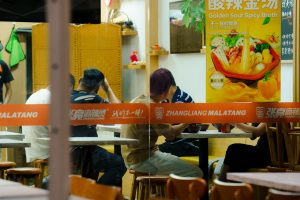Top image: Screengrab via The Daily Ketchup / Youtube
Before I watched a podcast released yesterday, the only factoids I knew about Prime Minister Lawrence Wong were (1) he likes playing the guitar and (2) his wife looks like a Korean actress. Putting policy aside, I didn’t really know much about the man.
Thanks to his latest appearance on The Daily Ketchup, though, I now know the following: he’s an INFP like Nelson Mandela and Mother Teresa, he practices public speaking by reviewing recordings of himself (very relatable), and he still calls on Senior Minister Lee Hsien Loong for advice “from time to time”.
Just a few years ago, the idea of a sitting prime minister appearing on a podcast was unthinkable. Now, a sitting prime minister is making rounds on shows like Plan B and The Daily Ketchup.
The Daily Ketchup host Daniel Lim still sounds slightly star-struck that the show managed to get PM Wong on, introducing him as “the most unexpected guest that we’ll probably ever have on the show”. According to the team, they emailed his press secretary, hoped for the best, and got lucky.
Unexpected as it might be, it’s not an entirely inconceivable development, given the growing potency of podcasts. Where else can you hear politicians reveal unfiltered thoughts—or let slip something they didn’t mean to share?
The Power of Podcasts
Since GE2020 (an election that ran almost entirely on online rallies), Singaporean politicians have been steadily sliding into the world of podcasts, showing up on local favourites with growing regularity.
Progress Singapore Party Non-Constituency Member of Parliament Leong Mun Wai popped up on Yah Lah BUT, where he shared his forecasts and hopes for the country. Even straitlaced Indranee Rajah swung by The Daily Ketchup to talk all things housing from the perspective of a Second Minister for National Development. Minister for Digital Development and Information Josephine Teo sat down with influencers Jianhao Tan and Xiaxue on The Titan Podcast, a sentence I never thought I’d be typing out.
The rationale is sound—you need to meet your audience where they are.
Even in the media space, we’ve had to splice our content into bite-sized chunks for Instagram and TikTok because that’s where the eyeballs are. Walking the ground and showing your face in the heartlands may have been enough for politicians of yesteryears. But to reach out to a generation that would rather doomscroll than leave the house, podcasts are a natural choice.
And they’re proven to be potent. Over in the US, analysts credited Trump’s podcast and livestream blitz as one of the keys to his election victory. While Trump was mocked for the lacklustre turnout at his rallies, he was building his audience elsewhere, shooting the breeze with young, male, right-leaning podcasters The Nelk Boys, Logan Paul, and Joe Rogan, among others. The result? 56 percent of young men voted red in 2024, up from 41 percent in 2020.
What makes podcasts such powerful tools for political outreach? Unlike press conferences, where seasoned journalists grill candidates, podcasts take a more relaxed, conversational approach. The audio format adds an intimate layer—listeners feel like they’re sitting in on a personal chat, fostering a sense of connection that’s hard to replicate elsewhere.
It’s a chance to strip away the polished facade and reveal the human side of our leaders. It’s a better value add than simply doing TikTok dances.
“It makes a lot of sense because podcasts have been one of, if not the most, authentic forms of content out there. Listenership continues to rise worldwide, so this trend will likely continue and maybe even speed up,” says Yah Lah BUT co-host Haresh Tilani.
That’s not to say that podcast appearances are a breeze. Politicians need to think on their feet, stay articulate, and tackle a range of topics without the safety net of a script. And let’s not forget—every word they say could easily make headlines.
When they do stick to a script, it’s always painfully stilted and obvious. Today’s media-literate audience can always tell the difference between authenticity and pretence. As Haresh points out, audiences quickly notice when something feels forced or fake, and it instantly breaks the connection.
“What is worrying is the possibility that these episodes with politicians start getting too manufactured and overly sanitised, which is what turned people off from mainstream political interviews in the first place.”
Alternative Engagement
Several local podcasters I approached are all too aware of this unprecedented trend of politicians turning to podcasts for further engagement with voters.
Johnathan Chua, CEO and co-founder of GRVTY Media and one of the hosts of The Daily Ketchup, offers: “I do believe that the medium of 24/7 attention-grabbing soundbites on TV or even news headlines aren’t the best way to articulate the required nuance of governance in a world that is increasingly divided and vocal through social media. So I do think that a long form podcast is a reasonable avenue that is increasingly considered for this purpose.”
Jonathan Leong, the man behind off-beat podcast Singaplex, which covers everything from prison life anecdotes to kinks, has a more measured view of the power of podcasts in Singapore. Podcasts present an opportunity to be at the heart of current conversations in an attention-deficit world, he says—but it’s not the surefire way to stick in people’s minds.
“In Singapore, everyone is also wary of saying something in the media and having it hang over their heads years later. The best political content in Singapore is when someone screws up or says something so out there, resulting in it becoming a meme.”
It’s a fair assessment. To this day, Heng Swee Keat’s East Coast Plan moment remains one of the most memorable moments from the last election. And who could forget the National Solidarity Party’s Chong Hon Heng with his “thumbs up man” howler from 2015?
Beyond the memes lies a bigger truth: mainstream media no longer holds the monopoly on shaping hearts and minds. Ignoring newer, more alternative media platforms isn’t just a missed opportunity—it’s a rookie mistake for any political candidate this coming General Election.
Local politicians know this all too well post-Covid. As Johnathan points out, ministers began appearing on The Daily Ketchup as early as 2022 to share candid thoughts on pressing social issues.
Cutting Through The Noise
What does this all mean for GE2025, then? If GE2020 was the year of online rallies, will GE2025 be the year of podcasts?
We’re not there yet in the political landscape. Podcasts—and, to a larger extent, new media—demand a certain level of vulnerability and authenticity that hasn’t been a strong feature of Singaporean political culture. For politicians to thrive in this space, they need to be more than just well-versed in policy—they need to be comfortable with the casual, often irreverent tone that modern algorithms encourage.
That, I feel, is a line that politicians have yet to embrace. Singaplex’s Jonathan agrees.
“We are a more risk-averse society, so everything is—and will likely remain—rather tame. Politics here is also seen as organisationally driven with distinct top-level viewpoints and message positioning; not swayed by individual personalities,” he remarks.
“Based on their affiliations, we can already imagine what stance and talking points someone will roll out before it even leaves their lips. It’s all highly predictable.”
This predictability makes podcasts and alternative media such a compelling space for the younger electorate. For them, these platforms may not only shape their political views but challenge them in ways traditional media never could. But this is where things get tricky.
Our politicians (mostly) operate within a framework of respectability and decorum—traits that have served them well but also limit their ability to engage meaningfully with a generation that values directness over formality; nuance over slogans. Will today’s voters appreciate politicians trying to get real, or will they see it as another form of packaging?
There’s another deeper question at play here: Are podcasts the best way to bridge the generational divide? For terminally online Gen Z and millennials, podcasts may feel like a natural extension of how they engage with the world. But for older voters, it may seem like a distraction from the real issues at hand.
There’s also overexposure—the risk of fatigue is high. As we’ve seen with influencer culture (and questionable online ads), audiences may tire of the constant drip of content. What begins as an opportunity to connect can quickly become noise if politicians fail to offer something fresh or meaningful beyond stale talking points.
Room Tone
It’s a win either way for local podcasters when the General Election rolls around this year. They’re fully aware of how their platforms will be harnessed to influence public opinion.
The Daily Ketchup may bring in political experts and commentators, and is considering a daily live-streamed show during the GE period with political campaigners dropping by. Terence Chia of Yah Lah BUT promises they’ll keep delivering incisive, authentic content while teasing a groundbreaking project for GE—something that’s never been done in Singapore before by any creator, he says.
What’s certain is that GE2025 won’t just be about policies. It will be a contest over who can master the digital tools of our time to drive convincing narratives.
Today’s voters are done with the same old political theatrics. They want authenticity, something raw and real. They want to know that they’re being heard. Whether through a podcast or a TikTok (or a deep dive profile on RICE), GE2025 will be shaped—and perhaps decided—on digital turf.






